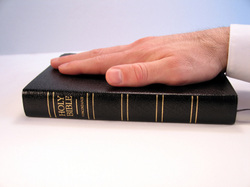
The Pharisees didn’t place a lot of emphasis on saying what they mean. Instead they had developed what one commentator called “evasive swearing”. They divided oaths into two categories. Those they had to keep and those they didn’t necessarily have to keep. The way they divided these oaths depended on whether or not God’s name was involved. If the name of God was used in the oath, then it had to be kept no matter what. However if you managed to give an oath without using God’s name, well then you didn’t necessarily have to keep that oath.
The result of evasive swearing was that if someone swore by God’s name then he would keep that oath without fail. But if they swore by anything else he felt perfectly okay with breaking the oath if he wanted to. As you can imagine this led to people’s word being basically meaningless unless they had sworn in God’s name that they would do something. The way they figured this was that if they had sworn by God’s name then they had made God a partner in their oath and so they were bound to keep it. If they didn’t keep it not only had they broken their word but they had also insulted God. On the other hand if they didn’t use God’s name they didn’t break their word when they changed their minds and God really didn’t care since His name hadn’t been invoked in the oath.
This is the attitude that Jesus is taking to task in this passage. He tells them that they are only pretending to be people of integrity. They want to give the appearance of being truthful and honest people without all the hassle of having to actually be truthful and honest people. One great truth they failed to recognize is that our lives cannot be divided into the secular and the sacred. There is just our life and there is no part of our life that God is not a part of. There is not one standard of truthfulness at church, one with our friends and another at work. There is just one standard and its God’s standard. God’s standard is honesty.
It’s easy for us to look down on the religious leaders for their use of evasive swearing, but if we were to be honest we have our own methods of evasive swearing. Instead of swearing by the temple, we say things like…
“I’ll think about it.”
“Well, maybe.”
“I might do that.”
“We’ll see.”
“Let me check to see if I can.”
Or if we really want to sound pious we will say, “I’ll pray about that.”
Of course there are plenty of times when these are genuine answers and that is fine. In fact, the Bible tells us it’s wise not to be rash in giving our word. But there are just as many times when these are safe, non-committal answers that allow us time to think of good reasons why we can’t do whatever it is that has prompted this answer. It’s our own form of evasive swearing and our form of evasive swearing now is just as wrong as their form of evasive swearing was then.
In Psalm 101 David said, “I will lead a life of integrity in my own home.” What impact do you think it has on our kids when they see us use our own form of evasive swearing? What does it say to them when they see us give non-committal answers so that we can get out of something, or outright lie and then tell them, “Now, don’t you lie to me”? Or even worse, what does it say to them when we have them lie for us by saying something like, “Answer the phone and if it’s for me tell them I’m not here”? Integrity is not integrity unless it’s lived out at home. If we are going to be men and women of integrity we must be honest in our speech. We would all say that we value honesty, but do our actions and attitudes reflect this value?
God wants us to be honest in our speech. God wants us to keep our word. To be a man of integrity we must say what we mean and mean what we say.
This post was written by Rev Ross. For the original post, go to: http://stacyjross.wordpress.com/2013/07/30/say-what-you-mean-and-mean-what-you-say/
BE HOLY.
BE A MAN.
 RSS Feed
RSS Feed